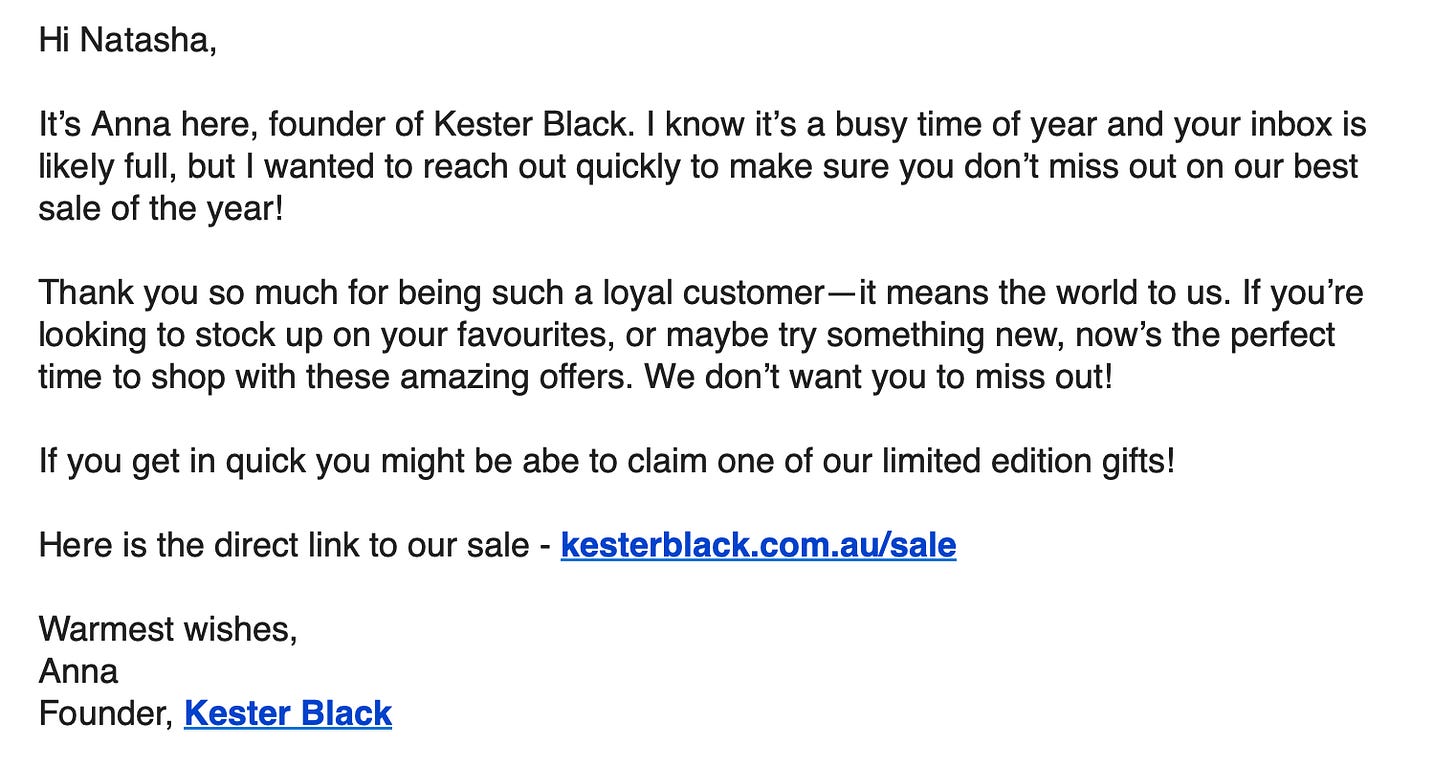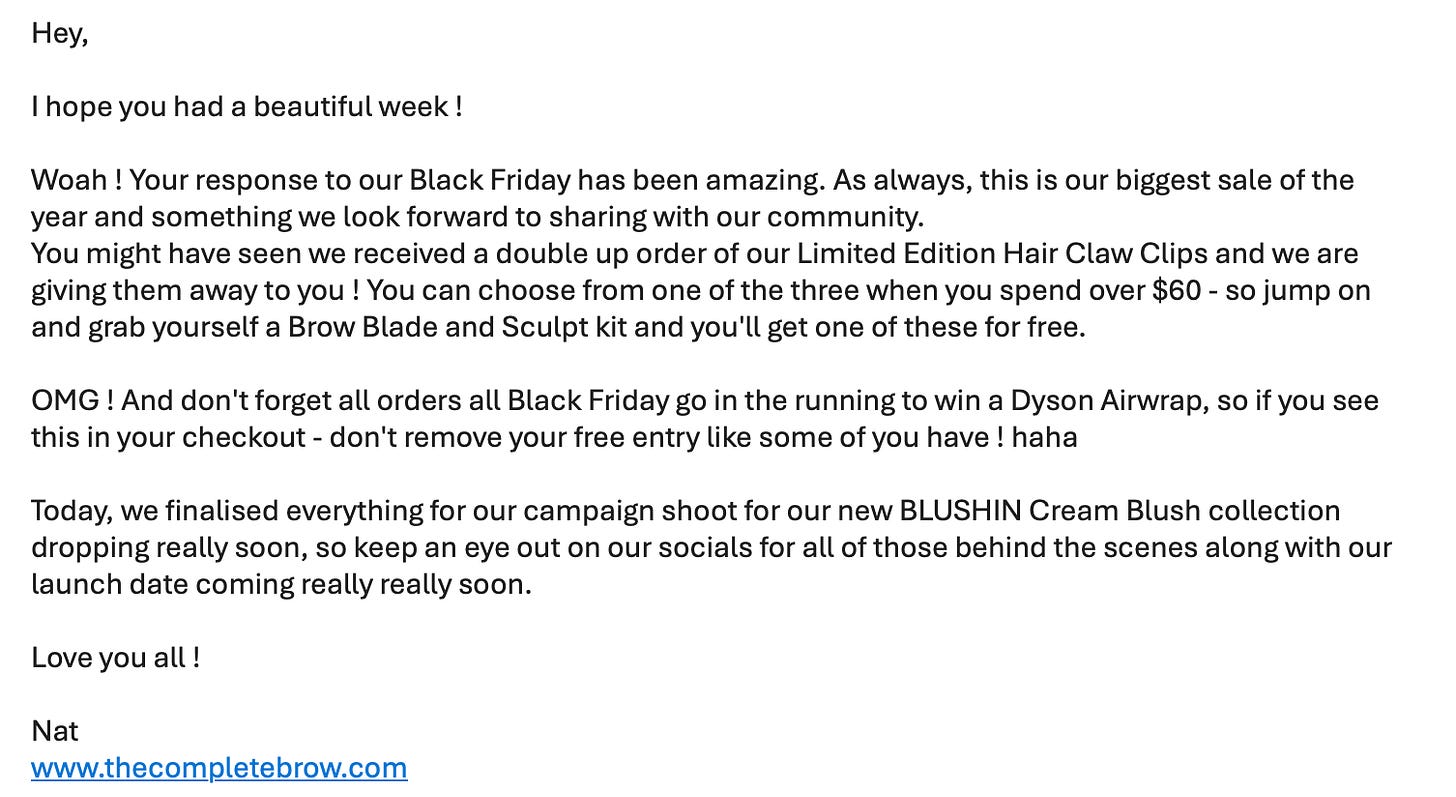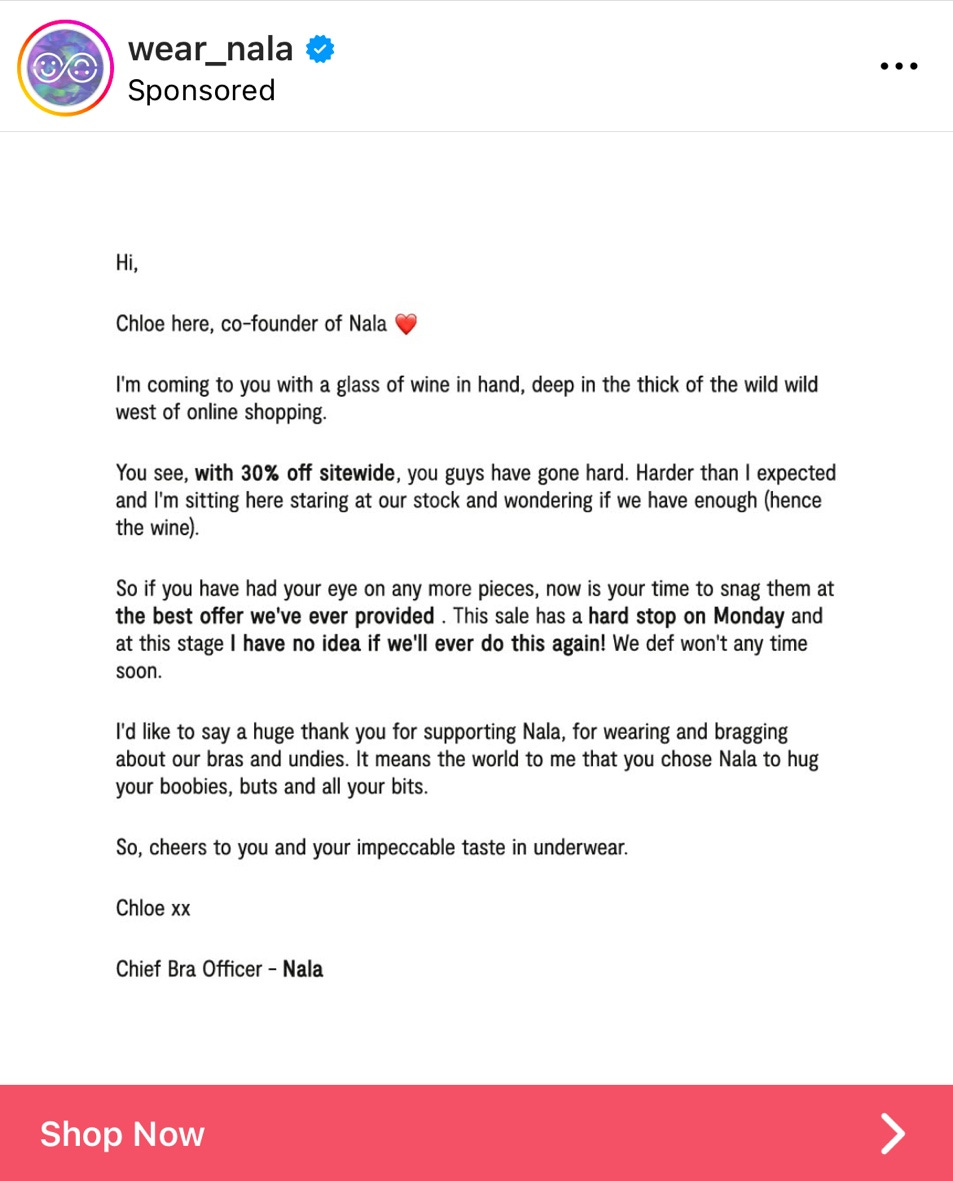Can You Blame Me?
Marketers have me right where they want me.
One of the things I declare in this newsletter is that I am a consumerist. It’s by no means my worst trait, but totally something I reflect on a lot. But whatever, the point is I was very susceptible to the Black Friday sales this year. Sales which began far before the actual day of Black Friday – a day which means nothing in Australia because as far as I’m aware Thanksgiving is one thing, we have decided we don’t need to adopt, so far. So, in my mind Black Friday = discounts and YouTube content.
To participate in said sales, either by gaining access to the discount, the sale itself or at checkout, I had to give over information and then put up with the continual communication – some I chose to unsubscribe from, others I needed to stay subscribed to because the sales hadn’t started yet, so I was keeping an eye on when. At times, the communication felt annoying and incessant. The success of Electronic Direct Marketing eDM – so essentially email lists – feels difficult to measure, because they need to be measured over the long term.
The main purpose of an eDM campaign seems to be fostering customer relationships, either pre-existing or creating new ones, and through keeping customers up to date, encourage them to act, whether that be buying something or attending something (to eventually buy something). Traditional email lists are mainly for promotional purposes.[1]
From a consumer’s perspective eDM’s make us feel included, as if we are part of an elite club. I am subscribed to marketing lists for The Gentlewoman, and everything is continually UK based, I don’t live there but it’s a way to connect with the bi-annual magazine in between issues. The other perceived benefit to us is tricky; whilst we have access to discounts, sales, or products before others, we also must exchange our personal information and valuable information about our shopping habits to get in on this. It’s like the conundrum about social media – we don’t pay so how are these companies so rich? And if we don’t pay, we are not actually the client.
One of the interesting changes I’ve noticed in eDM is the ‘founder email’. Previously I only received these from non-for-profits and the now closed, Hey, Tiger chocolate company. Now however, I have been receiving a number from small businesses and even seen some messages posted on Instagram too.
Below are two examples, one is personalised by including my name, acknowledging the volume of emails we receive and assuring me that they don’t want me to miss out. The first is from a company I signed up to so I could buy discounted nail polish. The latter is from a company I have bought from once so far.
Nat from The Complete Brow takes a different approach. The email isn’t personalised, but it does reaffirm the community, not missing out and also makes liberal use of exclamation marks. Unlike the first, it points towards new products to keep an eye out for, maintaining the momentum and interest.
Unfortunately, Nat from The Complete Brow accidentally sent out an internal email to the marketing list instead and she finished that with ‘Love you all!’ as well, so she must really mean it.
Now, I’ve never bought from Nala, but they have paid for a post to be shared that explains that the co-founder is stress drinking wine because people have bought too much stuff on sale! This is a really classy way to share the same message of those shouty ‘never to be repeated/Kent Bruce has gone mad’ ads.[2]
The hangover of Black Friday sales is real. I have since unsubscribed from lots of mailing lists, including the two brands above. I don’t need the encouragement and the value of being on the list does not outweigh having to deal with the communication. I sign up to emails for brands I have unsubscribed for, I stay subscribed to brands I am interested in. I don’t follow any brands on Instagram, so I feel like this is the best way to stay up to date with what’s happening. Why I feel the need to stay up to date is something else entirely.
Amongst all this, I watched Buy Now: The Shopping Conspiracy on Netflix. One of the many things I’ve watched, felt confronted by and still struggled to change my habits afterwards. I then backed this viewing up by re-reading The Power of Less by Leo Babauta. The irony of the number of books I buy about buying, needing, and wanting less stuff is not lost on me. This type of media is a media I deeply enjoy, paired with clearing out videos on YouTube, but it’s a media I enjoy probably because in between interacting with it, there is lots of consumption that required this palette to be cleansed.
The documentary is confronting, it uses AI to show the huge amounts of waste generated by our over consumption. It also takes a tongue-in-cheek approach by guiding you through the steps you need to get away with being a company that participates in the practices which create and encourage this.[3] One of the repeated ideas in this documentary was that companies need to take more responsibility for the life of the product once its left their shelves as consumers are only participating in a system which has been created for them, even if it’s no benefit to them. An idea that Content Creator Victoria Magrath brought up in one of her latest Vlogmas videos.
What necessarily benefits all these parties individually (the businesses, the consumer, and marketers) is not what benefits any of them in combination, further to this, what benefits the owners of these companies is not necessarily the same thing as what benefits employees.
Marketing is also very clever, as is the service provided by businesses – so we can continually reassure ourselves our value isn’t tied up in material worth, but the emotion and socially aware advertising plays us in a different way entirely.
Marketers are just doing their job, businesses need to make money and so on. The cycle however, feels relentless and I am on the train, assessing which station I’m trying to jump off at.
Tell me, did you buy anything in the Black Friday Sales? Or did you buy something in that period that wasn’t on sale?
Today’s title is inspired by YouTuber Lucy Raine who in her explanation of why she bought off TikTok shop, even though she said she wouldn’t, was because of how cute the jumper she bought was.
[1] This is a jumble of an explanation paraphrased from here.
[2] Obviously and thankfully depictions of mental health have changed.
[3] The content is worth looking past this.







Loved this! I noticed the proliferation of the founder-as-relatable-friend Black Friday comms too. Funnily enough, most of mine were also in beauty (skincare brands, tanning brands, haircare) which is interesting, but also somewhat expected with both my remit and the gender skew in local start-up beauty companies.